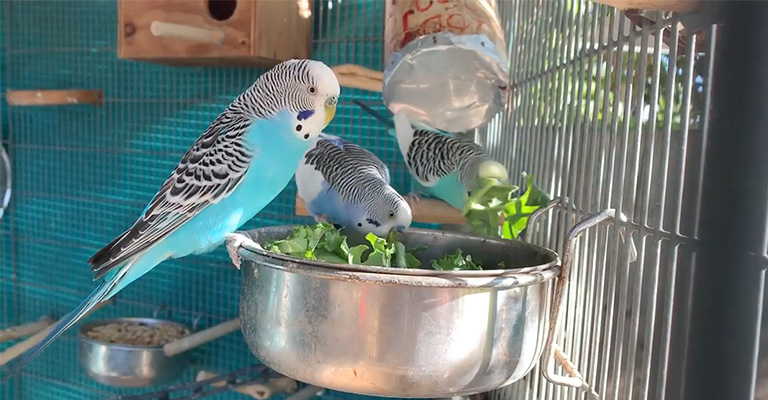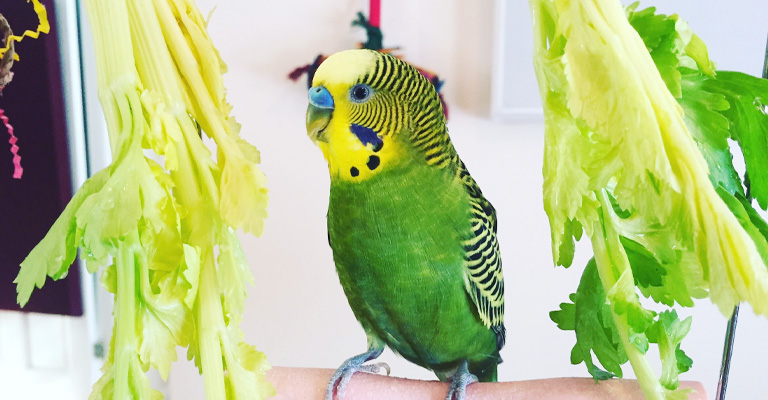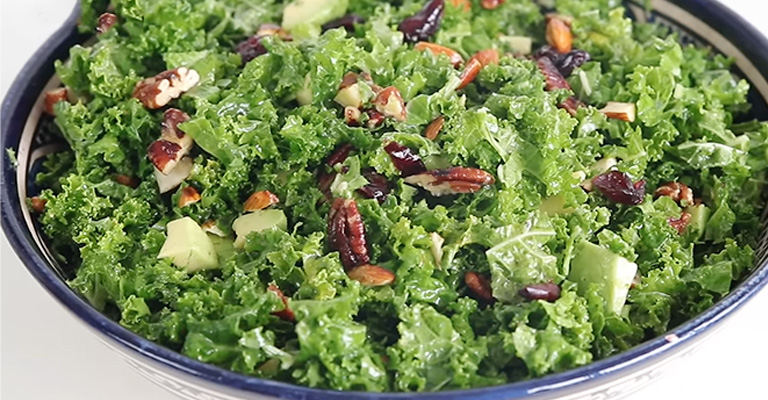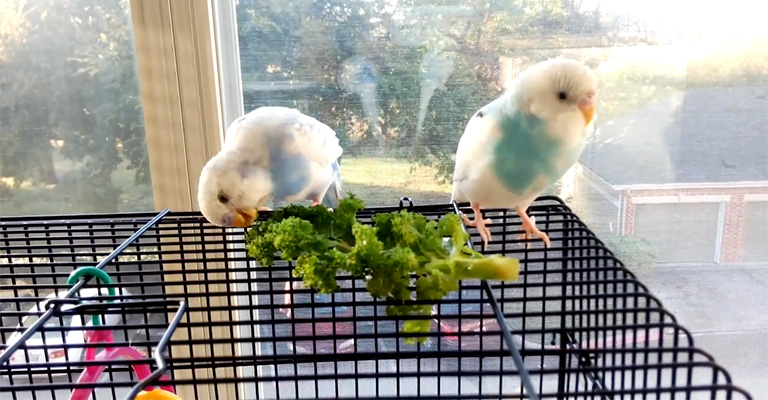The question of whether can parakeets eat kale is a common inquiry among bird enthusiasts looking to diversify the diet of these small and vibrant parrots.
Kale, a leafy green vegetable celebrated for its nutritional richness, is increasingly sought after as a potential addition to their food repertoire.
Understanding whether kale is a safe and beneficial choice for parakeets involves exploring its nutritional value, preparation methods, and reception by these charming and social birds.
In this discussion, we will delve into the suitability of kale as a component of a parakeet’s diet, considering both its advantages and precautions.
Armed with knowledge about this leafy green, parakeet owners can make informed choices to promote the health and well-being of their beloved feathered companions.

Can Parakeets Eat Kale?
Yes, parakeets can eat kale, and it can be a healthy addition to their diet. Kale is a leafy green vegetable rich in essential nutrients such as vitamins A, C, and K, as well as calcium, fiber, and antioxidants. These nutrients are beneficial for parakeets, contributing to their overall health and well-being.
To serve kale to your parakeets, provide fresh, clean leaves with any tough stems removed. Chop the kale into small, manageable pieces or offer whole leaves, depending on the size of your birds. It’s a good idea to rotate kale with other fresh vegetables and fruits to provide dietary variety and ensure balanced nutrition.
However, as with any new food, introduce kale gradually into your parakeets’ diet to allow them to adjust to the taste and texture.
Some parakeets may take time to accept kale, so patience is key. Additionally, ensure that the kale is free from pesticides or contaminants before offering it to your feathered friends.
Why Should Parakeets Eat Kale?

Parakeets can benefit from consuming kale for several compelling reasons, each contributing to their overall health and well-being. Here are some reasons why parakeets should eat kale:
Nutrient-Rich
Kale is packed with essential nutrients, including vitamins A, C, and K. These vitamins play crucial roles in maintaining a parakeet’s overall health, supporting their immune system, promoting proper growth, and enhancing their vibrant plumage.
High Fiber Content
Kale is an excellent source of dietary fiber, which aids in digestion and helps prevent constipation in parakeets. A healthy digestive system ensures efficient nutrient absorption and contributes to their well-being.
Calcium for Strong Bones
Kale contains calcium, which is essential for the development and maintenance of strong bones and beaks in parakeets. Adequate calcium intake is especially important for breeding females and growing chicks.
Antioxidants for Health
Kale is rich in antioxidants, such as beta-carotene and flavonoids, which help combat oxidative stress and support a healthy immune system. These antioxidants can help protect parakeets from various illnesses.
Hydration
Kale has a high water content, which can contribute to parakeets’ hydration levels. Proper hydration is vital for their overall health and helps prevent issues related to dehydration.
Low in Calories
Kale is a low-calorie food, making it a healthy addition to your parakeet’s diet without contributing to excess calorie intake. This can help prevent issues related to obesity or excessive weight gain.
Variety and Mental Stimulation
Introducing kale into their diet adds variety and mental stimulation for parakeets. Offering different foods keeps their diet interesting, promotes foraging behavior, and can prevent boredom.
While kale offers numerous benefits, it should be offered in moderation as part of a balanced diet that includes other vegetables, fruits, seeds, and high-quality pellets.
Monitoring your parakeets’ response to kale and providing dietary variety ensures they enjoy a nutritious and engaging diet.
How Do You Serve Kale To Parakeets?

Serving kale to your parakeets requires careful preparation to ensure it’s safe and appealing to them. Here are some techniques for offering kale to your feathered friends:
Fresh Kale Leaves
Offer fresh kale leaves with the tough stems removed. Place the leaves in a clean feeding dish, and let your parakeets peck at them directly. Fresh leaves provide the full nutritional benefits of kale.
Chopped Kale
Chop kale into small, manageable pieces, making it easier for parakeets to eat. You can mix these chopped kale pieces with their regular bird food or offer them separately in a dish.
Kale Salad Mix
Create a kale salad mix by combining kale with other parakeet-safe vegetables like carrots, bell peppers, or cucumber. This colorful medley adds variety to their diet and encourages healthy eating.
Steamed Kale
Lightly steam kale to soften it and make it more palatable for parakeets. Allow the steamed kale to cool before offering it to your birds. Steaming helps release the kale’s aroma and flavor.
Frozen Kale
Freeze small portions of kale to offer your parakeets a refreshing treat on hot days. Thaw a small amount and present it to them. The cool temperature can be enticing and hydrating.
Kale on Skewers
Thread kale leaves onto a bird-safe skewer and hang it in the cage. This engages your parakeets in playful foraging behavior as they peck at the kale leaves and enjoy the novelty.
Kale Puree
Create a kale puree by blending kale with a small amount of water. Offer this as a moist treat in moderation. You can also mix it with their regular bird food or other vegetables.
Remember to introduce kale gradually into your parakeets’ diet, monitor their response, and ensure the kale is clean and free from contaminants. Providing dietary variety and options for serving kale keeps mealtimes interesting and enjoyable for your feathered companions.
How Can I Know If My Parakeet Is Loving Kale?

Parakeets may display various gestures and signs to indicate their enjoyment of kale. Here are the behaviors and signals that can suggest your parakeet loves kale:
Eager Eating
If your parakeet eagerly approaches the kale, pecks at it repeatedly, and consumes it readily, it’s a clear sign of enjoyment. An enthusiastic appetite and immediate interest in the kale demonstrate their preference for this leafy green.
Vocal Expression
Happy chirping, vocalizations, or contented chatter while eating kale can signify your parakeet’s pleasure. Parakeets often vocalize when they are in a positive and relaxed mood, indicating their enjoyment of the meal.
Repeated Visits
If your parakeet keeps coming back to the kale, nibbling on it repeatedly even after they’ve had their fill of other foods, it suggests that they find the kale particularly appealing and satisfying.
Messy Beak and Feathers
After eating kale, if your parakeet’s beak and feathers are messy with bits of kale, it’s a sign that they have been actively consuming and enjoying the food. Messy eating behavior can be a positive indicator.
Happy Body Language
Observe your parakeet’s overall body language while eating kale. A relaxed posture, fluffed-up feathers, and a contented demeanor, such as a softly swaying body, signify enjoyment and comfort.
Playful Interaction
If your parakeet engages in playful activities around the kale, like hopping around it, tossing it in the air, or exploring it with their beak and feet, it demonstrates their fascination and delight in the food.
Increased Appetite for Kale
If you notice that your parakeet shows a growing appetite for kale over time, consistently choosing it from a mix of foods, it indicates a preference for this particular leafy green.
While these gestures can suggest your parakeet’s enjoyment of kale, it’s essential to monitor their response to new foods and ensure that kale is part of a balanced diet alongside other vegetables, fruits, seeds, and high-quality pellets.
Offering dietary variety keeps their meals interesting and ensures their nutritional needs are met.
FAQs
Can parakeets eat kale?
Yes, parakeets can eat kale. Kale is a nutritious leafy green vegetable rich in vitamins and minerals, making it a healthy addition to their diet when offered in moderation. It provides essential nutrients that support their overall health.
How should I prepare kale for my parakeets?
To prepare kale for your parakeets, remove tough stems and chop the leaves into small, manageable pieces. Offer it fresh or lightly steam it to soften the leaves. Always ensure the kale is clean and free from pesticides before serving.
Is kale a suitable daily food for parakeets?
While kale is nutritious, it shouldn’t be a daily staple. Rotate it with other vegetables and fruits to offer a balanced diet. Diversity ensures they receive a variety of nutrients and prevents them from becoming overly reliant on one food item.
Are there any health benefits to feeding kale to parakeets?
Yes, kale offers health benefits due to its high nutritional content, including vitamins A, C, and K. These nutrients support the immune system, promote good vision, and contribute to overall well-being when consumed as part of a balanced diet.
Can kale be served to parakeets of all ages?
Yes, kale can be given to parakeets of all ages, but it should be introduced gradually, especially to younger birds. Monitor their response and ensure they tolerate it well.
Kale can be particularly beneficial for growing chicks due to its calcium content, aiding in the development of strong bones and beaks.
Conclusion
Parakeets can indeed eat kale, and it can be a valuable and nutritious addition to their diet when introduced thoughtfully. Kale offers a wealth of essential vitamins, dietary fiber, and other nutrients that can benefit the overall health of these small parrots.
However, moderation and careful preparation are crucial to ensure it complements their diet rather than overwhelms it. By offering fresh kale leaves, either whole or chopped, parakeet owners can provide their birds with dietary variety and potential health benefits.
Monitoring their response to kale and incorporating it alongside other vegetables, fruits, seeds, and high-quality pellets ensures a balanced and enjoyable diet for these lively and intelligent avian companions.